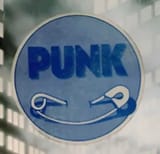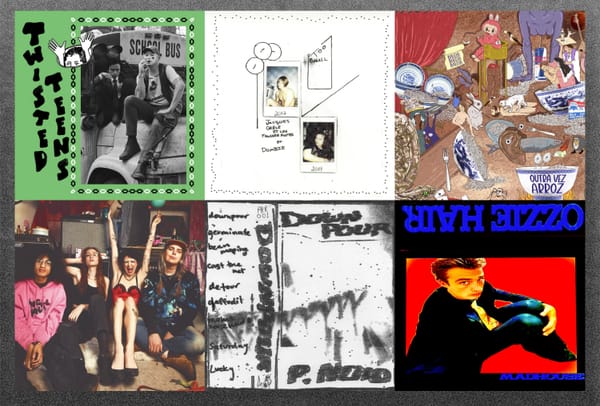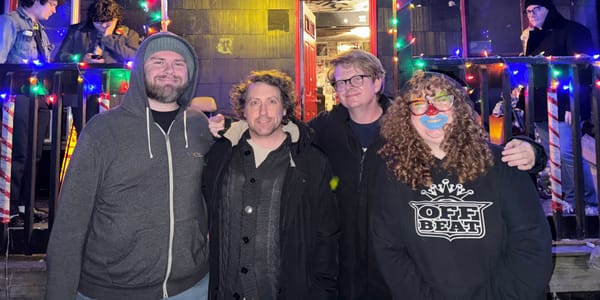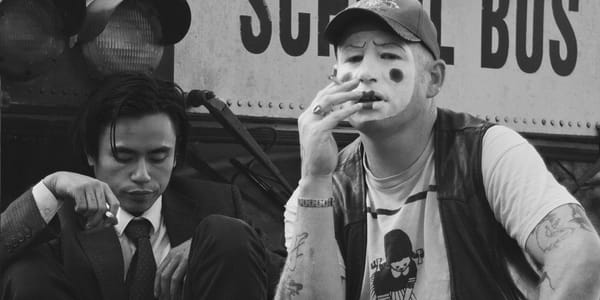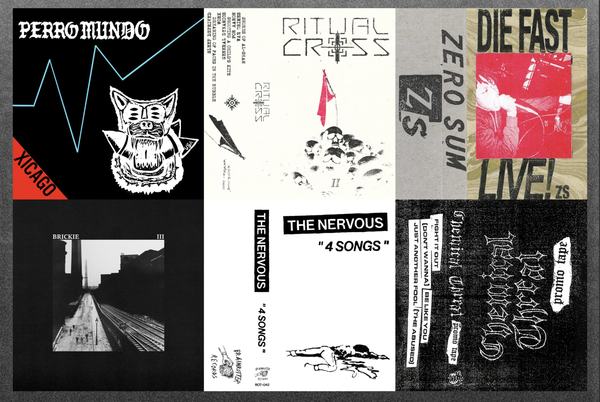cicada are from richmond, the best hardcore scene in the u.s.
“We’re existing in this bigger world of punk bands existing in the scene, and the scene is the scene all over the world.”
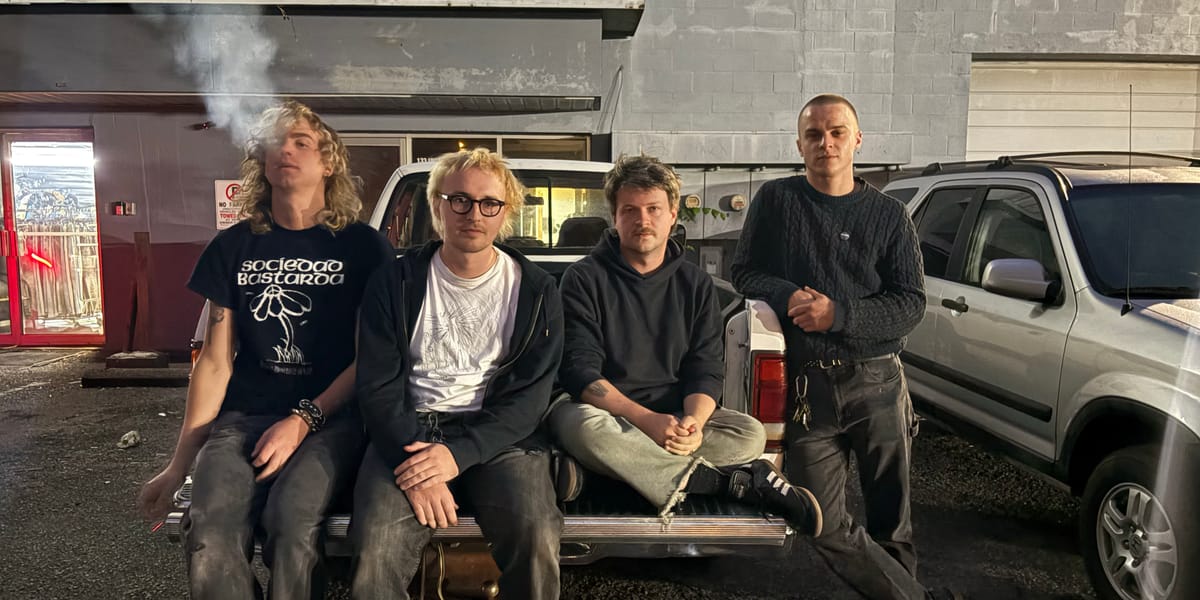
I don’t know much about bugs—one of my many faults—but you don’t have to be an entomologist to know a cicada when you see or hear a member of their freaky brood. I know more about ’80s hardcore, albeit secondhand, than the order of Hemiptera, or “true bugs,” of which cicadas rank. But not unlike “punk” or “hardcore” being used to classify music willy-nilly, “bug” is about as precise a term when it comes to referencing the 10-quintillion odd critters known to grace the globe. And so we’re left with the kingdom, phylum, class, order, family, genus and species of punk rock, and your—I dunno?—garden variety: Proto Mid-Atlantic D.I.Y Anarcho D-Beat Stenchcore Punx?
Richmond’s Cicada are just as quick to cite largely unsung Japanese and Italian underground hardcore punk outliers from generations before they were born as primary influences (Cheetah Chrome Motherfuckers, Gauze, Gudon, Indigesti and Wretched) as they are to dismiss kowtowing to genre altogether. Cicada are the Hemiptera of bands: “true punks.” Sure, they look and sound it, but after spending a little more than an hour with the four members at their practice space sandwiched between a makeshift church, indeterminate department store, and an auto bodyshop, the band’s defining trait is a bond between members and their insistence to exist on those terms alone.
Even when Cicada’s guitarist Brendan Reichhardt pinpoints the distinct sound of hitting “every single note on the fretboard in, like, a 42-second song,” it’s the attitude he describes which crystallizes the blunt force impact of Cicada: “pushing it to its limits and not staying within a specific box.” Their singer Jordan Barrett cuts to the heart of the matter with a matter-of-fact origin story of band from when he and Brendan were still living in DC. “We were talking about how we were both the most depressed we’ve ever been, and Brendan was like, You wanna start an Italian-style hardcore band when we move to Richmond? And I was like, Yeah, let’s do it.”
How’d you land on the name Cicada?
Felix Gotschalk (drums): From what I remember, we bounced a lot of names off of each other and they all kind of sucked. Cicada was the one we could all agree on.
What were some names that sucked?
Felix: There was Mustard Boys. And Bizarro. [everyone laughs]
Jordan Barrett (vocals): When Brendan threw out Cicada I started thinking about the crazy memories I have of Cicadas, like, walking on the ground as a kid and crunching a million dead ones. Exoskeletons everywhere. They're such a cool fucking bug. But the one thing is when we started the band, we didn't want to have any bug imagery.
Kevin McCormick (bass): Yeah, someone commented on some video, Are they gonna break up? And their next release is 17 years from now?
Felix: Every time we've commissioned someone for art we’re explicitly like, No bugs!
Jordan: It’s also death and rebirth.
Brendan Reichhardt (guitar): I remember when I was a kid and it was like a wonderland of them. I was blown away by it. I would—pretty cruelly—go around with a Power Rangers sword and just cut them in half. Then the next time I saw them was living in DC and I was going to this audio engineering school and it was like the fucking plague. There wasn’t a centimeter anywhere that you wouldn’t see a cicada. The sky was black with cicadas and I hated it.
You all play in other bands and even some of the same other bands. How do you differentiate Cicada from all the various projects?
Felix: Cicada feels like the thing I’m most excited to do. It’s the most intensive songwriting out of every band I’ve ever played in and feels really true to what I want to be doing.
Brendan: With Cicada, you can’t take one of us out and have it be Cicada. We clicked so naturally. Everyone brings something to the table that ends up working and feeling intuitive.
Kevin: Each band is doing its own thing. It’s not a super thought-out or constructed thing. It’s just like you put all the people in a room and you naturally converge all of their influences and make whatever that band is gonna be. None of the bands are restricted. Cicada just sounds like Cicada. Black Button sounds like Black Button.
How do you prioritize your various bands?
Felix: It happens pretty naturally. One band will be doing things during a certain time of the year and you focus on that.
Cicada has a European tour coming up. What’s the consensus? Are you all excited?
Brendan: Oh yeah. We’re very excited. We get to go out with Necron 9, who are good friends of ours. Leo, who plays drums in that band, put out the record for us.
Jordan: It’s one thing to be going on such an exciting tour, but also doing it with our good friends who we don’t get to see very often, who just happen to be one of the best bands in America. And going to a bunch of places I haven’t seen before. Yeah, that’s gonna be super sick.
Have any of you been there before to play music?
Brendan: Yeah. I went there about 10 years ago with my old band Protestor from DC. We did a tour with Red Death around the same fest that we’re gonna be playing: K-Town in Copenhagen. It was awesome.
Felix: Our good friend Bobby from Brainrotter booked the whole tour for us. He’s really who we have to thank for the whole thing.
Kevin: We met him in Milwaukee at the Unlawful Fest and he was like, If you guys ever want to come to Europe, let me know. Then he booked the whole thing and we’re all so grateful for him. He's doing so much. He’s letting us borrow gear and he organized getting a driver, getting a van. And he’s done all the work. I don’t know how we’ll ever pay him back.
Felix: Do the same for him whenever he tours the U.S., I guess?
Kevin: Exactly.
Felix: It was funny. I just mentioned touring to him and he was like, Yeah mate, we’ll get you sorted. And that was kind of it.
Do you have any reservations about being Americans traveling overseas with so much Ugly American behavior running rampant?
Kevin: I don’t think any of us are happy with Americans either.
Felix: All those people know and can appreciate that we don't support the way that our government acts.
Kevin: We’re on the same page regardless of who’s president, but we don’t really rock with presidents.
I had some friends touring overseas recently who felt paranoid about not being welcome as Americans, punk band or not.
Kevin: Anything could happen, but we’re gonna go out there and try and do it and we’ll see what happens.
Brendan: I feel like people have pretty level heads on their shoulders in terms of us not being the ones who are doing the horrible things, you know? We’re not responsible for this. I can’t say the same for Americans when people come over here, but at least I know in the punk scene no one’s gonna be giving us a side eye.
Is there any pressure to acknowledge politics more explicitly?
Jordan: I don’t feel any pressure. In general, I don’t make a ton of political statements on stage or with music. The songs aren’t explicitly political, and I feel in that sense, I try to let it speak for itself rather than saying the same shit that everybody says, like, Fuck, it sucks. Everything sucks, man. We know! You know?
Kevin: Yeah a lot of the time that’s people talking to reaffirm that everyone on the same side is on the same side. It’s like, I get it. There’s some value to that. But there’s more to be said when you’re actually doing something as a band, like playing benefit shows or actually raising money to donate and show your voice that way. I think it’s less important to explicitly say things on stage. It’s a bubble. Actually doing something is more important.
Do you have a preference for how people hear your music?
Brendan: YouTube. Physical media is king, but I don’t care about getting it on streaming platforms or anything like that. I want it to be accessible to people, but I don’t necessarily want to contribute to things like Spotify or Apple Music or whatever or pay to have it put on somewhere. If someone wants to do that, that’s fine. But the most important thing is to share music with friends and in the community.
Felix: All our music is on Soulseek. That’s the one place to find it all.
Kevin: I think it just feels bad to try and be a marketing agency for your own band. You know what I mean? It just feels bad. Like it feels wrong. It shouldn't be something that we should have to do.
Felix: It’s embarrassing.
Kevin: I don’t think it’s about fuck bands who do that. It just feels bad for us. We’re lucky to work with labels who are down to handle it and we just get to be a band and not a marketing agency.
Touring Europe without any social media seems like a luxury. Do you think social media is the easy way out or is there risk associated with not having that presence?
Felix: That’s the norm with the kind of punk that we play. Nobody has an Instagram. The way anybody finds out about a show is from a promoter flyering around the city or a promoter posting it on their personal Instagram. The people that want to go to these shows know that.
Kevin: Having a bunch of Instagram followers doesn’t mean that people are gonna come to the show either. We’re existing in this bigger world of punk bands existing in the scene, and the scene is the scene all over the world. Everyone is excited to go to shows and wants to support touring bands because then they get to see some cool shit that they haven’t seen before.
Jordan: I think the whole thing speaks to why it’s so sick to do things without the help of, like—I don't know, a fucking Taco Bell sponsorship. We don’t have our stuff on Spotify or whatever. We don’t have an Instagram, and we are still able to do all this shit. We’re able to go on this tour just from making a friend. That’s the beauty.
Brendan: It’s a community. This punk scene is a global thing and you meet people along the way. And I think there is no magic trick or mystique or anything. It’s just if you want to do it, you start doing it. I think that’s true for anything. You just keep plugging away, and you meet people who like your stuff and get excited, and it grows from there.
Felix: Everybody is friends. All the punks are friends across the globe.
Kevin: There will probably be some duds, but I don’t think having an Instagram would make more of the shows pop off. And if we do a good job, then people are naturally gonna come out more next time we do the thing. The tried and true way a band should operate is touring. That’s the only way—actually engaging with it in person.
Brendan: And I love a dud. My other band Hologram played this show in Louisville, Kentucky back in 2021 with Fashion Change from Seattle. I think there were two people there and a sound guy. And it was a huge room. And it was so much fun 'cause we just got trashed and didn’t care. It was kind of more freeing than actually playing to a bunch of people. And the people who were there bought stuff and we crashed with them.
Jordan: I do really enjoy a bizarre show. That’s my favorite shit. We’ve played Ohio three times probably. And everybody’s like, Why? It’s because I fucking love Ohio.
Where in Ohio?
Jordan: We played Cleveland, Cincinnati, and Columbus. All really great shows we had a lot of fun at. No. We played four shows in Ohio. Because we played that college show with Hotline TNT in Athens. We toured with Hotline TNT—
Felix: They have Instagram. [everyone laughs]
Jordan: They have Instagram, but we rock with them.
Kevin: People came out because of that.
Jordan: We played this festival for the Ohio University radio station. The dude before us was just playing like an acoustic guitar and talking about, like, parking lots and stuff. And then we played and that was the drunkest I’ve ever been. Kevin got really hammered too. It was a beautiful little town with a funny, cool bar. I had so much fun.
Felix: Yeah, we were doing crazy shit on stage. I was standing up behind the drum kit.
Jordan: Yeah, we didn’t give a fuck. There was a frat boy mosh pit.
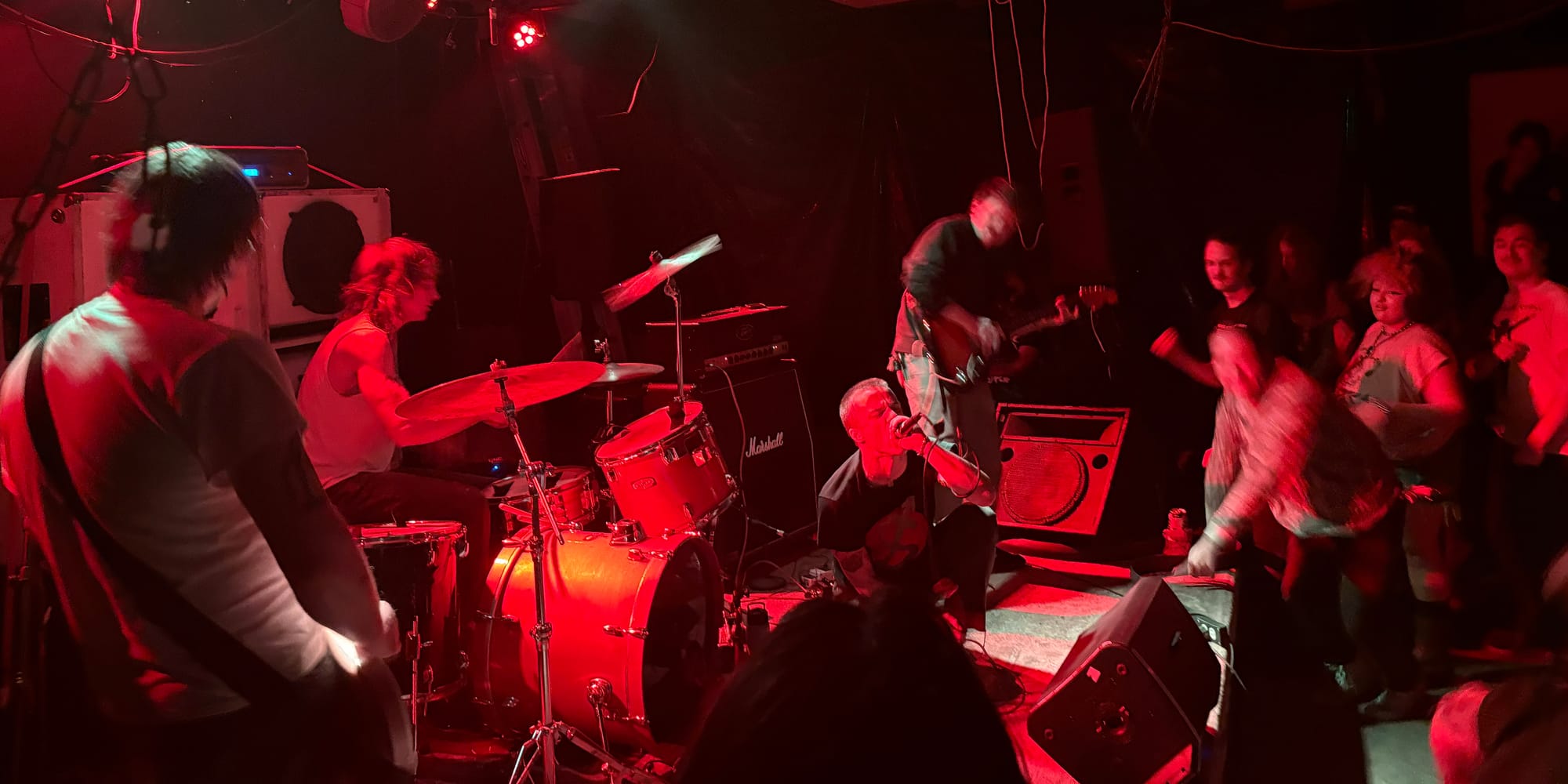
What’s your favorite place for Cicada to play?
Brendan: The best show we ever played was Unlawful Assembly Fest.
Jordan: I’m trying to think of my favorite place that we’ve been because of music.
Kevin: New Orleans. I love New Orleans.
Jordan: New Orleans was for sure up there.
Felix: That was another dud, even though there were 400 people there.
Why a dud?
Felix: This black metal band played for an hour before us and everybody left.
Jordan: It was New Year’s Eve and everybody just kind of came to party. And then we played right before the ball dropped and everybody left right before because it’s such a party town.
Where are you excited to play on this tour?
Jordan: Paris. Croatia, for sure. Copenhagen.
Brendan: Everywhere, but especially some of the out-of-the-way cities that I’ve never heard of, like Pula.
Jordan: Pula is the city in Croatia that Leo found a last minute show for us. It’s a coastal town where everybody seems to vacation. All we heard is that it’s good swimming, so stoked on that.
Kevin: I think wherever we go, it’s gonna be fun because it’s a brand new place and we’re all just gonna be having fun, hanging out, as long as we don't get pulled over in Austria for being overweight or something.
Tell me about your relationship to the punk scenes in Richmond vs. DC, since Brendan and Jordan have lived in both cities.
Jordan: Richmond is the greatest hardcore punk scene in America. If you live here it’s pretty easy to just say that. Everybody here is awesome and plays in an awesome band. There’s a new band popping up every second that’s really good and everybody’s friendly and awesome. And I hear people talk about other scenes in America and I’m like, This just sounds horrible.
Felix: Everywhere we’ve been on tour people tell us Richmond has the best scene in the country, which is crazy.
Jordan: All of this sounds very self-stroking, like, We’re the shit. Blah, blah, blah. But I hear so much shit about egos and bullshit and people who are playing in bands that are not worth noting who think they’re hot shit. We don’t really have much of that here.
Felix: Yeah, we don’t have that here at all. Everyone's humble and kind, and friends with one another. All the bands rip and we have great community spaces like the Warehouse and VSC, where shows have gone on for years. I think a lot of other cities don’t have consistent pillars of the community to allow their scenes to thrive.
Kevin: All this stuff builds on itself and it takes years to actually make something where there can be a new band or two every month and they can get shows and they can thrive right out the gate and be excited and don’t have to struggle as much as you might in another city where it’s hard to get your first show. The punk scene here has been building for, honestly, like decades. I think we’re just in a cool time to be living in Richmond and playing punk music and who knows how long it lasts. It’s bigger than us. It’s the city itself and it feels good to be living here right now, aside from rent and shit. It’s all love to anybody doing this shit anywhere, Richmond just happens to be the best right now.
Felix: The five to ten punks in DC do try really hard and do a good job.
Is doing the punk thing easier in Richmond than DC?
Brendan: It’s funny 'cause there was a time where it flip flopped. When I first started going to shows, I hated coming down to Richmond ’cause DC was where it was popping off. And there was a ton of bands.
Felix: It was all stoner and sludge bands here back then.
Brendan: Hardcore, like gang shit, like crew shit. Richmond was pretty macho for a while, so coming down here was crazy. I started to feel like I was definitely Void-side of the Faith/Void-split, and I was like there’s not a lot of shit like this. And so I just started to gravitate more towards that and wanted to do more bands like that. It was more of a personal falling out with DC than saying that DC fell off. I just had my own ideas. And I think we got in at a time when there was an upswing again with new bands and a ton of people moving here. That’s kinda what you need. DC gets new life in, but the political climate is getting worse and it’s hard to live there and I felt that acutely. Cops everywhere. It’s just fucked up.
Any plans for new music in the coming year?
Felix: We got half a song written for an LP. We just need another half, and then maybe 10 or 11 more songs. Maybe 12. Our songs are pretty short.
Kevin: After the tour will be writing time.
Are your families supportive of Cicada or even into Cicada?
Brendan: Oh yeah. My stepmom isn’t like a huge fan of loud music. And my dad, you know, he’ll call me sometimes and be like, I really like that rhythm in that one song, or whatever, you know? But yeah, fully supportive and very excited about it.
Jordan: My parents don’t really understand it or enjoy it, but they fuck with it. They like that I get to hang out with my friends and am doing something productive and being able to travel because of it. I think they’re stoked on that.
With hardcore punk in such a stable place, with a growing audience, what’s the challenge of keeping it exciting and creative?
Brendan: I’m always excited by a band that does something new when you can hear the actual individual in that band. That’s what gets me excited. All the D4MT Labs bands in New York: Kaleidoscope, Tower 7, Straw Man Army, Destruxion America? That shit is awesome to me. I don’t think people should be afraid to do something different. Not that theres anything wrong with a genre band or a specific style.
Felix: Yeah. Everyone needs to keep playing fast. That’s it. End it.
see/saw is a fully independent punk and rock'n'roll journalism operation. If you enjoyed this piece, please consider subscribing.

